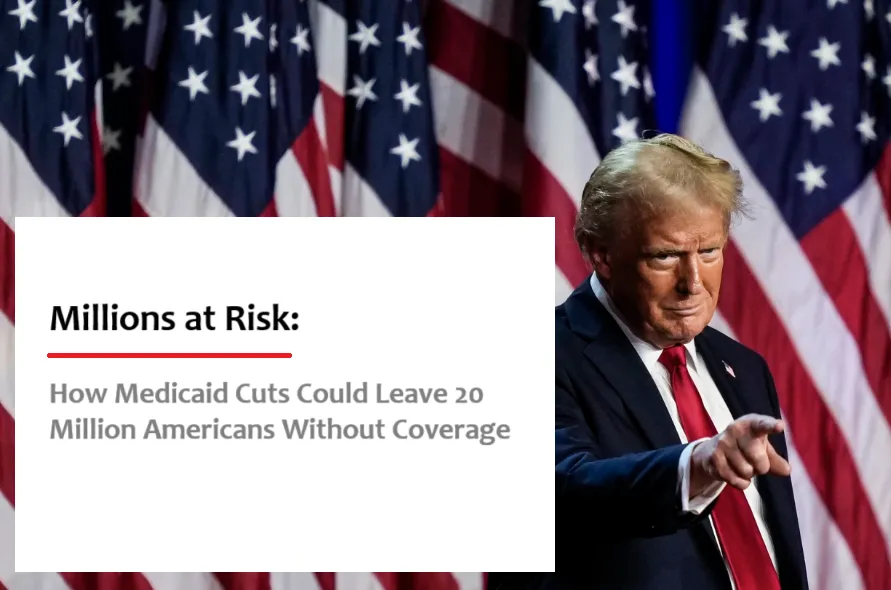
How Medicaid Cuts Could Leave 20 Million Americans Without Coverage
Millions at Risk: How Medicaid Cuts Could Leave 20 Million Americans Without Coverage
The proposed cuts to Medicaid expansion funding could leave up to 20 million Americans without healthcare, forcing states to make impossible choices. The future of affordable healthcare is hanging by a thread—will Congress step in before it’s too late?
By Lisa | February 2025
For millions of Americans, Medicaid isn’t just a program—it’s a lifeline. It ensures that low-income families, seniors, and individuals with disabilities can access critical healthcare services. But a new analysis from KFF has raised alarms about the future of Medicaid expansion under the Affordable Care Act (ACA).
According to the report, a proposed reduction in the federal government’s contribution to Medicaid expansion—from 90% down to 70% or even 50%—could lead to devastating consequences. If states cannot afford to make up the difference, as many as 20 million people could lose coverage, and total Medicaid spending could drop by a staggering $1.9 trillion over the next decade.
What This Means for You
At its core, Medicaid expansion was designed to help those who fall into the coverage gap—people who earn too much to qualify for traditional Medicaid but too little to afford private insurance. It has been a crucial safety net, particularly in states that opted into expansion under the ACA.
KFF’s analysis outlines two possible scenarios:
States Fill the Gap
If states choose to replace lost federal funding with their own resources, Medicaid enrollment would remain unchanged.
However, this would require states to increase their own Medicaid spending by 17%, amounting to $626 billion over 10 years—a financial burden many states simply cannot afford.
States Drop Medicaid Expansion
If states fail to cover the shortfall, they may be forced to cut Medicaid expansion altogether.
This would reduce total Medicaid spending by $1.9 trillion over the next decade and strip healthcare away from millions of Americans.
Unfortunately, many states—especially those already struggling with budget deficits—may find themselves with no choice but to scale back or eliminate expansion entirely.
Who Will Be Affected Most?
The impact of these cuts would be felt hardest by low-income adults, working families, rural communities, and people with chronic illnesses. Without Medicaid, many individuals would be left with no affordable healthcare options, increasing unpaid medical debt, emergency room visits, and preventable deaths.
Research has repeatedly shown that Medicaid expansion improves health outcomes by reducing hospital readmissions, improving maternal care, and ensuring early diagnosis for serious conditions like cancer and diabetes. If these proposed cuts move forward, we could see a public health crisis on an unprecedented scale.
Can Congress Prevent This Crisis?
With healthcare costs already a top concern for American families, cutting Medicaid expansion funding could set the system back decades. Policymakers will soon face a difficult decision: find a sustainable way to fund Medicaid expansion or risk millions of people losing access to basic healthcare.
Advocacy groups and healthcare professionals are urging Congress to consider the long-term economic and social consequences of these cuts. A healthier population leads to a stronger workforce and lower overall healthcare costs. But if Medicaid expansion crumbles, the ripple effects could be catastrophic.
What You Can Do
If you or someone you know depends on Medicaid, now is the time to stay informed and take action:
✅ Contact your representatives – Urge them to oppose cuts to Medicaid funding.
✅ Support local advocacy groups – Organizations like the Kaiser Family Foundation (KFF) and Families USA fight for healthcare rights.
✅ Share your story – Real-life experiences can help lawmakers understand the impact of these policies.
The future of healthcare access in America is on the line. Will we move forward, ensuring that everyone has the medical care they deserve, or will we allow millions to slip through the cracks? The decision isn’t just in the hands of lawmakers—it’s in ours too.
References:
Kaiser Family Foundation (KFF) Report (February 13, 2025)
Congressional Budget Office (CBO) Medicaid Projections
National Association of Medicaid Directors (NAMD)